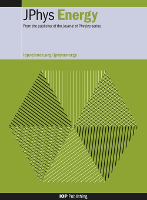
Journal of Physics-Energy
Scope & Guideline
Pioneering Discoveries at the Intersection of Energy and Materials
Introduction
Aims and Scopes
- Energy Storage Materials:
Research on advanced materials for energy storage systems, including lithium-ion, sodium-ion, and solid-state batteries, highlighting their performance, stability, and innovative fabrication techniques. - Photovoltaic Technologies:
Development and optimization of solar energy conversion technologies, including perovskite and thin-film solar cells, focusing on efficiency improvements, stability, and novel materials. - Caloric Materials and Effects:
Investigation of caloric materials for energy applications, including electrocaloric, magnetocaloric, and elastocaloric effects, aimed at developing energy-efficient cooling and heating systems. - Photocatalysis and CO2 Reduction:
Research into photocatalytic materials and systems for environmental remediation and CO2 reduction, emphasizing the synthesis of novel catalysts and mechanistic insights. - Advanced Manufacturing Techniques:
Exploration of innovative manufacturing methods such as 3D printing and additive manufacturing, particularly for energy devices and materials, to enhance scalability and performance. - Thermoelectric Materials:
Focus on materials that can convert waste heat into electricity, including their synthesis, characterization, and application in energy harvesting. - Electrocatalysis:
Studies on electrocatalysts for various reactions, including hydrogen evolution and CO2 reduction, with a goal of improving efficiency and understanding reaction mechanisms.
Trending and Emerging
- Sustainable Energy Solutions:
There is a marked increase in research focused on sustainable energy technologies, including renewable energy sources, energy efficiency, and sustainable materials, driven by global climate goals. - Hybrid Energy Systems:
Emerging interest in hybrid energy storage solutions that combine different technologies (e.g., batteries and supercapacitors) to enhance performance and efficiency in energy storage applications. - Advanced Characterization Techniques:
Growing emphasis on advanced characterization methods, such as operando techniques and machine learning applications, to better understand material properties and improve device performance. - Integration of AI and Machine Learning:
Increasing incorporation of artificial intelligence and machine learning in energy materials research, particularly for predicting performance and optimizing material properties. - Electrochemical Energy Conversion:
A surge in studies related to electrochemical systems, including fuel cells and electrolyzers, reflects a growing interest in efficient energy conversion technologies.
Declining or Waning
- Traditional Fossil Fuel Technologies:
Research related to traditional fossil fuel energy technologies has decreased, reflecting a global shift towards renewable energy sources and sustainable practices. - Basic Theoretical Studies:
The focus on purely theoretical studies without experimental validation seems to be waning, as the journal increasingly emphasizes practical applications and experimental results. - Single-Function Energy Systems:
The exploration of single-function energy systems, such as conventional batteries without hybrid or multi-functional capabilities, is less prevalent, suggesting a trend towards integrated systems. - Conventional Photovoltaic Materials:
Research on conventional silicon-based photovoltaic materials appears to be declining in favor of more innovative technologies like perovskites, which offer better performance and versatility.
Similar Journals

Joule
Shaping the Future of Energy with Insightful DiscoveriesJoule, published by CELL PRESS, is a premier journal dedicated to the rapidly evolving field of energy research. Since its inception in 2017, Joule has established itself as a leading source of high-impact studies in energy, achieving an outstanding Q1 ranking in the Energy (miscellaneous) category and ranking #1 out of 73 in the general energy field, placing it within the 99th percentile according to Scopus metrics. The journal aims to advance the understanding of diverse energy forms and their applications, providing a platform for significant breakthroughs that can drive sustainable practices and innovative technologies. Through rigorous peer review and expert contributions, Joule serves as an invaluable resource for researchers, professionals, and students engaged in tackling some of the most pressing energy challenges of our time. Based in the United States, Joule continues to foster collaboration and interdisciplinary approaches in energy research, striving to illuminate pathways toward a sustainable future.

Carbon Energy
Pioneering pathways to sustainable energy practices.Welcome to Carbon Energy, an esteemed open-access journal published by WILEY that focuses on cutting-edge research in the field of energy and materials science. Since its inception in 2019, this journal has quickly established itself as a leading platform for disseminating impactful findings and innovations related to carbon-based energy solutions, renewable resources, and sustainability practices. With its impressive Q1 rankings in multiple categories—including Energy (miscellaneous), Materials Chemistry, and Renewable Energy—Carbon Energy is recognized for delivering high-quality, peer-reviewed content that meets the rigorous standards of the academic community. Through its open-access model, the journal ensures wide accessibility of research findings, making it an invaluable resource for researchers, professionals, and students alike. As we look toward the future, Carbon Energy aims to further its mission of advancing sustainable energy technologies and promoting interdisciplinary collaboration in tackling global energy challenges.
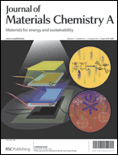
Journal of Materials Chemistry A
Exploring the Intersection of Chemistry and Renewable EnergyJournal of Materials Chemistry A, published by the Royal Society of Chemistry, stands as a leading peer-reviewed journal in the fields of Chemistry, Materials Science, and Renewable Energy. With an impressive ranking within the top quartile (Q1) across these disciplines in 2023, this journal not only showcases groundbreaking research but also addresses pivotal challenges in sustainable materials and energy. Spanning from 2013 to 2024, it serves as a vital platform for scientists and engineers to present innovative solutions and advances in materials that directly contribute to environmental sustainability. Accessible to a broad audience, the journal's contributions are essential for anyone engaged in the development of new materials and technologies that promise to shape a greener future. With a commitment to high-quality open access publishing, the Journal of Materials Chemistry A is instrumental in disseminating impactful research to enhance scholarly communication and foster collaboration in an increasingly interconnected research landscape.
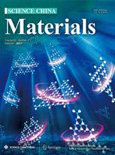
Science China-Materials
Empowering Discovery in Materials Science.Science China-Materials is an esteemed peer-reviewed journal dedicated to advancing the field of materials science, published by SCIENCE PRESS. With a strong focus on innovative research and applications, this journal provides an essential platform for disseminating groundbreaking findings in materials development, characterization, and engineering. Since its inception, Science China-Materials has achieved an impressive Q1 ranking in the Materials Science (miscellaneous) category, reflecting its commitment to quality and the impact of its publications, as indicated by its 86th percentile ranking in Scopus. The journal is set to converge its contributions from 2016 to 2024, making it a vital resource for researchers and professionals interested in the latest advancements and trends in materials science. As an open access publication, it ensures that knowledge is freely available to a global audience, promoting collaboration and innovation across disciplines. The journal is headquartered in Beijing, China, and continues to attract high-quality submissions from leading experts in the field.
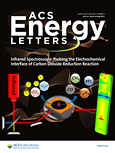
ACS Energy Letters
Exploring Cutting-Edge Research in Energy ScienceACS Energy Letters, published by the American Chemical Society, is a prestigious peer-reviewed journal designed to disseminate innovative and impactful research in the multifaceted field of energy science. Since its inception in 2016, the journal has quickly ascended to a remarkable status, achieving Q1 rankings in critical categories including Chemistry (miscellaneous), Energy Engineering and Power Technology, Fuel Technology, Materials Chemistry, and Renewable Energy, Sustainability and the Environment as of 2023. With an emphasis on rigorous research methodologies and interdisciplinary collaboration, ACS Energy Letters serves as a vital platform for scholars, professionals, and students to explore cutting-edge research that addresses contemporary energy challenges. While maintaining a commitment to advancing knowledge without open access, it offers profound insights into sustainable practices and innovative solutions that are crucial for the future of energy systems globally. The journal's esteemed standing in the chemical and energy sectors underscores its significance, making it an essential resource for anyone invested in the advancement of energy technologies and sustainable practices.

Battery Energy
Pioneering Research for a Greener Energy Future.Battery Energy is a pioneering open-access journal established by Wiley in 2022, dedicated to the dynamic field of energy storage and battery technologies. With an E-ISSN of 2768-1696, this journal plays a pivotal role in disseminating innovative research and advancements pertinent to the energy sector, including renewable energy solutions and sustainability practices. It holds a respectable position in Scopus rankings, being placed 32nd out of 78 in the Energy category and 130th out of 270 in Renewable Energy, Sustainability, and the Environment, showcasing its growing impact within the academic community. The journal aims to provide an inclusive platform for researchers, professionals, and students to share insights, foster collaboration, and tackle the pressing challenges associated with battery energy storage. By promoting open access, Battery Energy ensures that cutting-edge research is readily available to a global audience, facilitating the continued evolution of battery technologies for a sustainable future.

Advanced Energy and Sustainability Research
Empowering Research for a Sustainable FutureAdvanced Energy and Sustainability Research is a leading open-access journal published by WILEY since 2020, dedicated to advancing knowledge and understanding in the realms of energy and sustainability. With an impressive impact factor and a commitment to high-quality, peer-reviewed research, this journal serves an international audience of researchers, professionals, and students passionate about addressing critical environmental challenges. The journal encompasses a wide array of topics within environmental science and energy fields, securing notable rankings in Scopus with top percentiles across several categories, including Ecology, Energy Engineering and Power Technology, and Waste Management. Given its open-access model, Advanced Energy and Sustainability Research facilitates the dissemination of cutting-edge research, enhancing accessibility and fostering collaboration within the scientific community. This journal not only plays a pivotal role in shaping public policy and industry practices but also aims to inspire innovative solutions for sustainable development in an increasingly complex world.
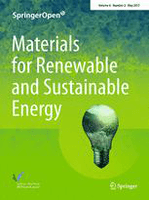
Materials for Renewable and Sustainable Energy
Innovating materials for a sustainable future.Materials for Renewable and Sustainable Energy, published by SPRINGER HEIDELBERG, stands at the forefront of research dedicated to advancing the fields of materials science and sustainable energy solutions. With an ISSN of 2194-1459 and an E-ISSN of 2194-1467, this prestigious journal has gained recognition as an Open Access platform since 2012, allowing broader access to innovative research. Situated in Switzerland, it boasts a distinguished reputation, reflected in its impressive H-index and classification within the Q1 and Q2 categories across multiple relevant fields, including Electronic, Optical and Magnetic Materials, Fuel Technology, Materials Chemistry, and Renewable Energy. Its Scopus rankings affirm its significance, particularly notable with a 29th place in Fuel Technology, placing it in the 77th percentile among peers. Covering a comprehensive array of topics from sustainable materials to cutting-edge energy technologies, Materials for Renewable and Sustainable Energy aims to disseminate pivotal knowledge that addresses the global challenges of sustainability and environmental preservation, making it an invaluable resource for researchers, professionals, and students alike.
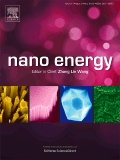
Nano Energy
Empowering Sustainable Futures through NanotechnologyNano Energy is a premier journal published by Elsevier, focused on the dynamic intersection of nano-technology and energy solutions. Since its inception in 2012, this high-impact journal has made significant strides in advancing research across multiple disciplines, showcasing groundbreaking studies in Electrical and Electronic Engineering, Materials Science, and Renewable Energy. With an impressive Impact Factor that places it in the Q1 category of these fields—including a distinguished rank of #6 in Electrical Engineering and #9 in Renewable Energy on Scopus—the journal serves as a vital resource for academics and practitioners alike. Nano Energy aims to disseminate innovative research and developments that contribute to the sustainable energy landscape, thereby addressing pressing global energy challenges. Researchers and professionals seeking to stay at the forefront of nanotechnology applications in energy generation and efficiency will find this journal an indispensable platform for sharing knowledge and driving impact.

Energy & Environmental Materials
Leading the Charge in Sustainable Material ScienceEnergy & Environmental Materials, published by WILEY, is an esteemed academic journal dedicated to pioneering research in the multifaceted domains of energy, environmental science, and materials science. Since its inception in 2018, this journal has rapidly established itself as a leading platform, holding a prestigious Q1 ranking across multiple categories including Renewable Energy, Sustainability, and Waste Management, reflecting its significant contributions to advancing knowledge in these critical areas. With a robust Scopus ranking that positions it in the top percentile for Environmental Science and Materials Science, it caters to a diverse audience of researchers, professionals, and students seeking cutting-edge findings and practical applications in energy efficiency and sustainable materials. This open-access journal facilitates the dissemination of innovative research and aims to bridge the gap between scientific exploration and real-world solutions for a sustainable future. The editorial team encourages submissions that explore both theoretical and practical aspects, ensuring that every publication not only contributes to the academic landscape but also drives impactful change in energy and environmental practices.